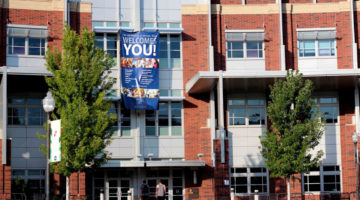
Maddison Cervantes/Nevada Sagebrush
Associated Students of the University of Nevada President Caden Fabbi (right) addresses the ASUN senate while Sen. Jacob Boult (left) listens in during a meeting on Wednesday, Nov. 4, in the Rita Laden Senate Chambers. Fabbi presided over the senate as speaker of the senate when the constitutional amendment aimed at creating another senator position was passed.
Staff Report
The Associated Students of the University of Nevada constitution is getting some minor tweaks this year, according to ASUN Attorney General Ryan Hood. The changes are aimed at adding a new senator to the 22-member senate in order to fill the gap left by the speaker, who often leaves their constituency unrepresented once they take on the role of speaker.
At the start of every new session, the senate elects a speaker from its ranks. Once elected, however, the speaker does little in the way of representing their own college as they now have to represent the body at large. This poses a problem for the smaller colleges, like the Interdisciplinary Programs or School of Journalism, who only have one or two representatives in the senate.
“Say you’re a [journalism] senator, right, there’s only one senator,” Hood said. “Say you’re elected speaker from the J-school. Well, you don’t really serve your constituents in the J-school anymore. You’re really focused on the duties of the speaker as a whole and running the senate body.”
Hood added that the speaker is limited in their direct participation because they can’t vote on any legislation unless there is a tie, which does not happen often, and the fact that speakers generally don’t write any legislation.
To tackle the hole in representation left by the speaker, the new amendment would allow for the runner-up in the general election to take the speaker’s place in the senate once they’re elected. If there is no runner-up, which happens most often in smaller schools and colleges, then the senate would appoint a new senator through the standard application process.
ASUN president and former speaker of the senate Caden Fabbi, who presided over the senate when the amendment was passed last spring, agreed that the speaker is often unable to fully represent their college.
“While they should be both, they’re not so much serving as a senator as they are the speaker of the senate,” Fabbi said.
Fabbi added that he thought the measure is important and a good thing going forward. He also reiterated Hood’s example of the J-school senator, saying that ASUN needed to fix the lack of representation.
While the measure was passed during the last session and the constitution has been updated to include the amendment online, both Fabbi and Hood don’t expect the amendment to be official until the senate’s next session.
The reason for this is that the process for amending the constitution is, intentionally, a long one. Much like the federal and state constitutions, amending the ASUN constitution is a far more rigorous process than passing regular legislation. Two-thirds of the senate has to pass the amendment before the amendment goes on to the general election ballot, where again, two-thirds of students have to agree to the measure.
At any of these points, amendments can easily fail. For instance, an effort to raise the amount of required credits to be elected into ASUN from seven to 12 was defeated at the ballot this spring and killed again in the senate chambers last month.
The amendment was first passed unanimously last session by the ASUN senate, while Fabbi was still speaker. From there, it went on to the ballot during the spring election and was soundly passed by the general undergraduate student body.
Fabbi explained that in the past, the final hurdle for amendments was that they had to be approved by the full board of regents. However, changes made earlier this year make it so that the chancellor is in charge of reviewing amendments and that the regents no longer have to vote on the measure.
He went on to explain that the lengthy approval process was a formality more than anything, and that once the amendment makes it up to the chancellor’s office, it should be approved in short order.
Both Hood and Fabbi expect the amendment to be official in time for the next session of the Associated Students at the end of the spring semester.
The news desk can be reached at jsolis@sagebrush.unr.edu and on Twitter @TheSagebrush.











